Report Released at the National Press Club, Available to view online at RespectAbility.org/Inclusive-Philanthropy
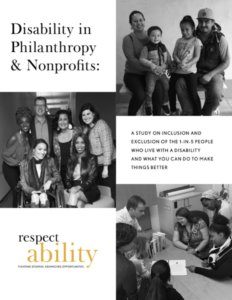 Washington, D.C., April 25 – Nonprofits and foundations are full of good work and good will. Nearly three-quarters (72%) of people who work in the social sector say their organizations have made a public commitment to Diversity, Equity, and Inclusion (DEI) and have policies that prohibit their groups from denying people with disabilities equal opportunity to participate in services and activities. Yet a new study out today shows that even among this very well-intentioned group, most foundations and nonprofits aren’t doing enough – if anything – to enable people with disabilities to have the access and accommodations they need to fully participate in the good these groups are doing.
Washington, D.C., April 25 – Nonprofits and foundations are full of good work and good will. Nearly three-quarters (72%) of people who work in the social sector say their organizations have made a public commitment to Diversity, Equity, and Inclusion (DEI) and have policies that prohibit their groups from denying people with disabilities equal opportunity to participate in services and activities. Yet a new study out today shows that even among this very well-intentioned group, most foundations and nonprofits aren’t doing enough – if anything – to enable people with disabilities to have the access and accommodations they need to fully participate in the good these groups are doing.
The study, “Disability in Philanthropy & Nonprofits: A Study on the Inclusion and Exclusion of the 1-in-5 People Who Live with a Disability and What You Can Do to Make Things Better” by RespectAbility, a nonpartisan group working on inclusion efforts for people with disabilities, surveyed 969 people who work at nonprofits and foundations, conducted five focus groups and spoke one-on-one with 14 executives at philanthropy-serving organizations. The study was released at an event this morning at the National Press Club in Washington, D.C. Anyone can read the study at www.RespectAbility.org/Inclusive-Philanthropy.
The Hon. Steve Bartlett, chair; Jennifer Laszlo Mizrahi, Founder; Aaron Dorfman, president and CEO, the National Committee for Responsive Philanthropy (NCRP); Stephanie Powers, Vice President for Policy and Partnerships, Council on Foundations’ Department of Public Policy and Government Relations; and Kerrien Suarez, Executive Director, Equity in the Center; spoke at the event.
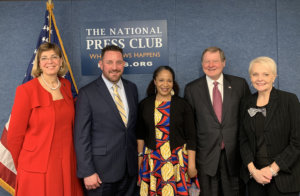
L-R: Jennifer Laszlo Mizrahi, Aaron Dorfman, Kerrien Suarez, Steve Bartlett and Stephanie Powers
“Philanthropy-serving organizations don’t know what they don’t know and often haven’t even thought about including people with disabilities,” said Jennifer Laszlo Mizrahi, Founder of RespectAbility. “Even among well-meaning groups who are engaged in a lot on racial and gender equity overall, disability is missing.” For example:
- Only 14% say their organizations use video captions to ensure people who are deaf or hard of hearing can use the content. Captioning services are easy to use and often free and yet 86% are not even attempting to take advantage of such tools.
- Similarly, just 30% of respondents say their organizations enable people with disabilities to request accommodations like sign language interpreters on event registration forms. Asking about accommodations sends a clear signal that people with disabilities are welcome and that inclusion is a consideration, yet 70% say their organizations do not make this effort.
- In addition, only 59% say their events always are held in physically accessible spaces.
What keeps these seemingly supportive and innovative organizations from doing even the bare minimum? According to the survey, bias is the top reason, cited by more than one-third (36%) of respondents themselves. Whether overt or implicit, prejudice against people with disabilities is a significant barrier to meaningful inclusion efforts. Additionally, few in positions of power are specifically asking that organizations make including people with disabilities a priority. This means funders and others in leadership positions are not requiring or even suggesting that attention be paid to disability inclusion.
“Organizations are at their best when they welcome, respect, and include people of all backgrounds, including people with disabilities,” said RespectAbility Board Chairman Steve Bartlett, a former congressman and one of the principal authors of the original Americans with Disabilities Act. “We hope these findings inspire the social sector to heal itself. It’s easier than you think to make improvements.”
The study also sheds light on what is working in the social sector. Specifically, having a DEI policy that calls out disability as an area of focus, and including people with disabilities in board, leadership and/or staff positions, makes a big difference. Whether the policies come before the practice or vice versa is not clear from the data, but the correlation is unmistakable. By every measure, groups that are explicit about disability inclusion as a priority and groups with disability representation within their ranks are more likely to be taking action.
| Orgs With No DEI Policy | Orgs With a DEI Policy | Orgs With a DEI Policy That Includes Disability | Orgs With People With Disabilities Among Board, Staff or Leadership | |
| Board includes people with disabilities | 17% | 26% | 34% | 45% |
| Professional leadership includes people with disabilities | 11% | 22% | 28% | 38% |
| Staff overall includes people with disabilities | 27% | 47% | 57% | 81% |
| Organization has made intentional efforts to recruit people with disabilities for employment, internships, volunteer or board positions | 15% | 26% | 34% | 38% |
| Organization asks members or grantees to intentionally include people with disabilities in their work | 10% | 23% | 28% | 25% |
| Organization depicts people with visible disabilities in marketing materials | 28% | 41% | 50% | 53% |
| Organization has an explicit public policy that people with disabilities cannot be denied an equal opportunity to participate in services and activities | 58% | 77% | 82% | 81% |
| Events always are held in physically accessible spaces | 49% | 63% | 67% | 71% |
| Website is set up properly for screen readers for people with low vision | 9% | 19% | 24% | 24% |
| All video content has captions for people who are deaf or hard of hearing | 5% | 17% | 21% | 20% |
| Public events enable people with disabilities to request accommodations such as sign language interpreters, live captioning, or food allergy alternatives | 21% | 34% | 38% | 40% |
| There is a process for employees, board, or trustees to request and receive accommodations if needed | 20% | 49% | 56% | 58% |
| Learning opportunities for staff include disability as an area of focus | 23% | 39% | 51% | 48% |
“Disability in Philanthropy & Nonprofits: A Study on the Inclusion and Exclusion of the 1-in-5 People Who Live with a Disability and What You Can Do to Make Things Better” includes actionable steps nonprofits and foundations can take to improve. There are tips for people in all facets of social sector work – leadership, communications staff, event planners, program managers, HR, and front-line direct service providers. Many are quite easy and come without cost. All that is required is the intention to do better.
The good news is that some nonprofits are starting to hire people with disabilities.
- In 2017, 826,824 workers with disabilities had jobs with nonprofit organizations.
- The disability employment rate among nonprofit employers increased from 8.9 percent to 9.1 percent between 2016 and 2017.
- There were about 33,922 new nonprofit jobs for people with disabilities in 2017. (Roughly 30 percent of new jobs for PWDs overall).
“Clearly, the potential here is enormous for people with disabilities, nonprofit organizations and the people they serve,” Mizrahi added.
RespectAbility offers free tools and training for nonprofits and foundations. See www.respectability.org/inclusive-philanthropy.

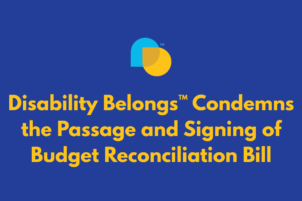
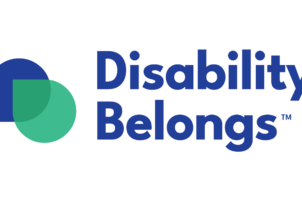
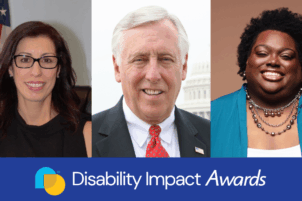




Insightful and incredibly revealing study, your graphic analysis is a terrific tool for sharing with legal counsel I’ve assisted as an expert witness in disability discrimination (and related causes of action) litigation. Thank you for a comprehensive “reveal” of even our best-intended organizations. Those great intentions are especially significant as we consider comparisons with orgs that may not avow similar concerns.